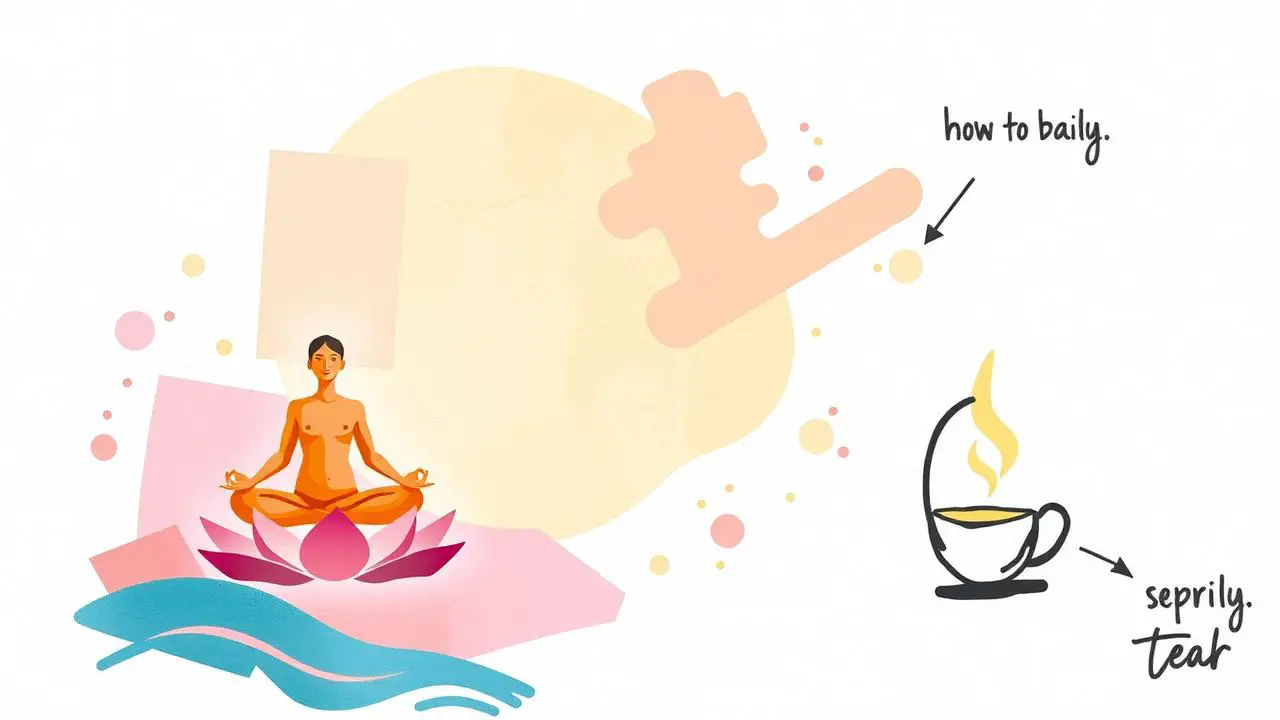Anxiety can be a debilitating condition, leaving you feeling overwhelmed and unable to relax. But it doesn’t have to be that way. With the right strategies, you can learn how to relax with anxiety and reclaim your life.
There are several ways to relax with anxiety, including deep breathing exercises, mindfulness meditation, muscle relaxation techniques, practicing yoga or Pilates, spending time in nature, taking a warm bath, listening to calming music, journaling, and seeking support from a therapist or counsellor. It is important to find what works best for you and to prioritize self-care practices regularly.
In this article, we’ll cover some simple ways to help you combat anxious feelings and bring more calm into your life.
We all want to feel relaxed and at peace, but when we’re dealing with anxiety, it can seem like a far-off dream. Luckily, there are many things you can do that will allow you to take control of your mental health and find moments of relaxation amidst the chaos.
Read on for some tips on how to relax with anxiety and start living in freedom again.
Recognizing Anxiety
Anxiety can be like a dark fog that blankets our minds and keeps us from seeing what lies ahead. It can feel like we are stuck in a loop of worry, doubt, and apprehension with no escape. However, there is hope to break free from this feeling if we take the time to identify the triggers, face our fears, and make positive changes in our lifestyles and thinking patterns.
To begin dealing with anxiety, it is important to recognize signs of stress such as fatigue or irritability. Taking steps towards positive lifestyle changes such as physical exercise, healthy eating habits, better sleep hygiene, and connecting with loved ones can all help reduce levels of stress.
Additionally, focusing on positive thinking and facing fears head-on can also be beneficial in managing anxiety.
By taking the time to understand our triggers and emotions surrounding them, we can start taking control of our anxiety and move towards a more relaxed state of mind.
Techniques to Help Manage Stress
The best way to manage stress is to take a holistic approach that includes both physical and mental strategies.
Positive affirmations, physical activity, healthy diet, and journaling can help you relax when feeling anxious.
Physical activities like yoga or going for a walk can help reduce stress levels by allowing you to move your body, release endorphins, and take your mind off of anxious thoughts.
Eating a balanced diet and supplementing with vitamins and minerals can also help reduce anxiety levels.
Mental strategies such as positive affirmations or writing in a journal can help reframe the way you think about anxiety and stressful situations.
Additionally, having social support from family members, friends, or even joining an online support group can be extremely beneficial when managing anxiety.
Taking care of your mental health is essential for reducing stress levels.
When feeling overwhelmed or anxious it’s important to take breaks throughout the day to practice deep breathing exercises that will help calm your mind and body.
Breathing Exercises
Making the decision to destress and relax can seem like an impossible task when dealing with anxiety. It’s as if no matter what we do, our worries refuse to be put aside and find their way back into our heads.
But rest assured, there are ways to help manage your stress and take that much needed break.
From calming music to positive self-talk, there is a plethora of techniques available for those seeking relief from their anxious thoughts.
Progressive muscle relaxation and guided imagery are two helpful methods for releasing tension and allowing yourself to breathe a little easier.
Art therapy has also been known to provide comfort and promote relaxation, allowing you to express your emotions in various forms of artwork.
As you begin your journey towards greater peace of mind, it’s important not only to explore these techniques, but also incorporate mindfulness and meditation into your practice.
Mindfulness and Meditation
Mindfulness and meditation are two powerful tools that can help reduce anxiety.
Mindful eating, positive affirmations, relaxation apps, and yoga poses can all be used to bring greater awareness to the present moment.
Journaling therapy is also a great way to track your progress in recognizing and accepting your anxious thoughts and feelings.
Taking time each day to pause, recognize what you are feeling without judgment, and take a few deep breaths can have a calming effect that helps soothe the nervous system.
Reflecting on the day’s activities with gratitude can also help support emotional balance.
In addition to focusing on small wins or successes throughout the day, writing down three things you are grateful for before bed can help promote mental clarity and inner peace.
Transitioning into the next step of sleep hygiene will provide more strategies for relaxing with anxiety in order to ensure restful nights.
Sleep Hygiene
After spending time on mindfulness and meditation, it is important to also focus on sleep hygiene. Establishing good sleep hygiene habits will help you relax and reduce your anxiety. Not only can it improve your quality of life but can also help with any underlying mental health issues.
One way to engage in better sleep hygiene is to establish a routine that works for you. Whether it’s going to bed at the same time every night or setting an alarm for when you should wake up, having a specific schedule can help you get the restorative sleep that your body needs. Additionally, positive self-talk or affirmations before bed can be beneficial as well.
It is also important to eat healthily, exercise regularly and seek out professional support if needed. Eating healthy meals throughout the day will provide your body with all the nutrients and vitamins it needs to stay energized, while exercising releases endorphins which boost your mood. In addition, seeking professional support can give you tailored advice and solutions that might work better for your lifestyle than general tips and tricks.
Taking care of yourself through sleep hygiene should always be a priority! Making small changes such as sticking to a routine or eating healthier foods can have a big impact on how you manage anxiety in the long run. Remember not to put too much pressure on yourself—you are doing great! With the right care and support, you are sure to find relaxation and peace from anxiety symptoms soon enough.
Professional Support
When it comes to anxiety, professional help can be an invaluable addition to lifestyle changes and cognitive restructuring. Seeking help from a mental health professional is an important step in managing symptoms of anxiety and finding relief. There are many therapy options available, including Cognitive Behavioral Therapy (CBT), Mindfulness-Based Stress Reduction (MBSR), Acceptance and Commitment Therapy (ACT), and Dialectical Behavior Therapy (DBT).
These therapies focus on helping an individual identify negative thought patterns, manage stress, and develop healthy coping skills.
In addition to professional support, self care is essential for managing anxiety. Practicing good sleep hygiene, engaging in regular exercise, limiting caffeine intake, eating a balanced diet, and engaging in relaxation activities such as yoga or meditation can all contribute to positive mental health.
Taking time out of your day for yourself to do something you enjoy can also help reduce feelings of anxiety.
It’s important to remember that everyone’s journey with anxiety is different. Working with a therapist or other mental health expert can provide the necessary tools to help you find relief from your symptoms and live a more fulfilling life.
Frequently Asked Questions
What Medications Are Available To Treat Anxiety?
Are you looking to manage your anxiety symptoms with medication? You’re in luck! There are a variety of medications available to choose from, each with their own unique effectiveness and side effects.
From anti-depressants, tranquilizers, and selective serotonin reuptake inhibitors (SSRIs) to beta blockers, benzodiazepines and even tricyclic antidepressants – the options are nearly endless.
But before taking any medication for anxiety, it’s important to get the advice of a doctor or mental health professional first.
In addition to medication, there are many lifestyle changes that can help manage symptoms of anxiety such as cognitive therapy, exercise, relaxation techniques and dietary changes.
With the right combination of medications and lifestyle modifications, you can take control of your anxiety and live a life free from fear.
What Are The Side Effects Of Anxiety Medications?
When it comes to treating anxiety, medications can help provide relief. However, there are risks associated with taking anxiety medications and drug interactions should be discussed with a doctor.
It’s also important to remember that medication alone is not a long-term solution to managing anxiety – stress relief practices like mindfulness and mental health support are essential for overall wellbeing.
With the right combination of medication, mindfulness practice, and professional mental health support, managing anxiety can become easier and more manageable.
How Can I Support A Friend Or Family Member With Anxiety?
Supporting a friend or family member with anxiety can be tough, but it is also an important step in their recovery.
Mindful meditation, cognitive behavioral therapy, stress management, positive thinking, and breathing exercises are all tools that can help your loved one manage their anxiety.
Consider talking to them about how they are feeling and offering them resources to help them cope.
Don’t forget to practice self-care too; set boundaries and take breaks when needed.
Being a source of understanding and support for someone dealing with anxiety can make all the difference in their journey towards better mental health.
Are There Any Natural Remedies For Anxiety?
Anxious feelings can be overwhelming, and it’s important to find ways to manage them naturally. Fortunately, there are many natural remedies for anxiety that can help you relax, such as yoga practice, diet changes, breathing techniques, meditation apps and herbal remedies.
Each of these methods has been proven to help reduce stress and promote relaxation. Yoga practice in particular helps to center the mind and body while increasing flexibility and strength. Diet changes can also have a positive effect on anxious feelings by improving your energy levels and decreasing inflammation in the body.
Breathing techniques and meditation apps are great tools for calming the mind when anxious thoughts arise. Finally, herbal remedies such as chamomile tea or lavender oil may provide additional relief. With the right combination of natural remedies, you can find freedom from anxiety and create a sense of ease in your life.
What Is The Best Way To Overcome Anxiety?
Overcoming anxiety can seem like an impossible task, but there are actually several techniques that can help you gain control back in your life.
Exercise, sleep hygiene, cognitive behavioral therapy (CBT), stress management and mindfulness meditation are all powerful tools to battle the negative effects of anxiety.
Through these techniques you can develop the skills needed to reduce and manage your anxiety on a daily basis.
Exercise is a great way to reduce stress levels, while CBT helps to reframe and challenge negative thoughts.
Sleep hygiene can help you get better rest at night, stress management provides coping strategies for when anxiety hits hard, and mindfulness meditation teaches the power of living in the present moment.
There’s no one-size-fits-all approach when it comes to overcoming anxiety – but with these helpful tips and techniques you can start taking back your freedom from fear and worry today!
Conclusion
It is important to remember that anxiety can be managed and treated in a number of ways.
Medications can help reduce symptoms, but it’s also important to look into natural remedies and lifestyle changes that can support your journey towards relaxation.
Social support from friends and family can also be beneficial, so don’t hesitate to reach out for help when you need it.
The key is to find what works best for you in terms of managing your anxiety.
You may find that certain activities like yoga or mindfulness exercises are effective in calming your mind and body.
It might also be helpful to create a soothing environment with items such as essential oils, candles, or even music that helps you relax.
Finally, remember not to be too hard on yourself; anxiety is something many of us struggle with and it’s okay if it takes some time before you learn how to relax effectively.
With patience and dedication, I’m confident you will find the resources and methods that help you manage your anxiety and lead a more relaxed life.




